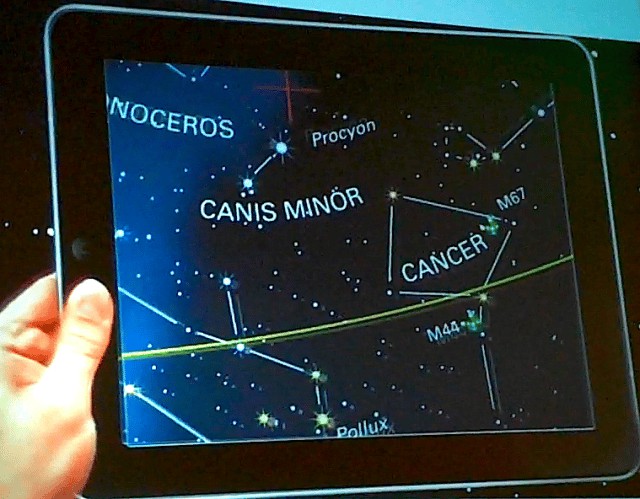
As the race to be be ebook format of choice hots up, Penguin is making some bold, experimental bets. These first-look demos of forthcoming books from iPad’s iBook Store, presented by Penguin Books’ CEO John Makinson in London on Tuesday, give an idea how publishers might approach Apple’s tablet…
Many of Penguin’s iPad books seem hardly to resemble “books” at all, but rather very interactive learning experiences, from its Dorling Kindersley and kids imprints – the Vampire Academy “book” is “an online community for vampire lovers” with live chat between readers, and the Paris travel guide switches to street map view when placed on a table.
“The iPad represents the first real opportunity to create a paid distribution model that will be attractive to consumers,” an excited Makinson told FT’s Digital Media & Broadcasting Conference. “The psychology of payment on tablets is different to the psychology on a PC.”
But Penguin’s thinking bigger than just the one device. Makinson said he sees ebooks hitting 10 percent of book sales next year (it’s currently four percent in the U.S. and Penguin’s ebook sales)…
“We will be embedding audio, video and streaming in to everything we do. The .epub format, which is the standard for ebooks at the present, is designed to support traditional narrative text, but not this cool stuff that we’re now talking about.
“So for the time being at least we’ll be creating a lot of our content as applications, for sale on app stores and HTML, rather than in ebooks. The definition of the book itself is up for grabs.
“We don’t know whether a video introduction will be valuable to a consumer. We will only find answers to these questions by trial and error.”
Makinson’s hardly retiring in negotiation with the key players – says he met Apple, Amazon (NSDQ: AMZN) and Google (NSDQ: GOOG) last week. But he views the key issue of revenue share with each as an opportunity…
Asked if he wasn’t about to give away 30 percent of Penguin sales to Apple (as is the split with apps), Makinson told paidContent:UK, during Q&A, this is better than the equivalent print agency model, in which publishers let retailers keep 50 percent.
Record labels are now lamenting having given Apple so much control of their industry, but Penguin appears to be relishing trying out all these new ebook formats, seeing “the opportunity to test pricing and access to consumer data”.
Not that Makinson wouldn’t take more from Apple (NSDQ: AAPL). “There is an argument for saying Apple needs the content, that they should be paying us for our content,” he said. But that argument hasn’t worked.
A copy of Pride And Prejucide might conceivably come with videos of Keira Knightly and Colin Firth (the movie adaptation’s cast), he said, but: “We need to understand how much the consumer will pay for that, we need to engage in dynamic pricing.